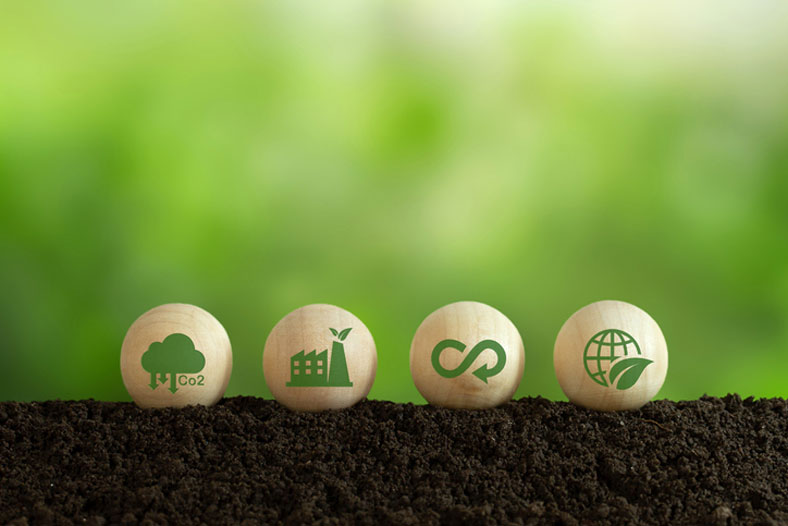Written by Scott Wilson

Environmental concerns are urgent, and the need is pressing to implement real solutions. We all feel that urgency coming through in every part of life, business, and politics. Just as global connections have transformed supply chain management, they have shifted perspectives on environmentalism. It’s clearer than ever that there are no clean divisions between nations. Everything that happens everywhere is affecting the ecosystem.
Businesses of all kinds are shifting today to take environmental considerations into account.
The concept of green logistics and supply chain management isn’t a big leap for most professionals in the field. Supply chain managers are constantly looking at the processes and patterns of supply flow into and through their organization. They seek efficiencies and improvements in everything from shipping to manufacturing. Looking for easier and less expensive ways to do things is built into the job.
Sustainability simply adds another set of considerations to the routine assessments logistics professionals already make. Bringing an awareness of the externalities of environmental damage back into the business is a big part of what corporate responsibility is all about. Supply chain managers are in a better position than most professionals to make that happen.
Sitting in a pivotal position in business, they have insight into procurement, production, transport, and storage, all pieces of supply chain operations that present unique opportunities for carbon output reductions and other environmental impact mitigations. And with the right education, they bring the specialized expertise to make those changes work for the business, ensuring they stick and help lead to a greener, more sustainable future.
What is Supply Chain Sustainability? Sustainability in the Supply Chain Isn’t Just About the Environment Anymore

Green is good for business. Corporate America has realized that sustainability and efficiency often go hand-in-hand. If you’re cutting fuel consumption, you’re not just serving green environmental goals. You’re also cutting expenses off the balance sheet.
On top of that, the COVID-19 pandemic reinforced many messages that environmental advocates had been pitching for years. Long, complex, overseas supply chains fell apart quickly; local and regional suppliers were less affected. In many cases, sustainability aligns naturally with supply chain resilience.
Sustainable Supply Chains Have Grown Alongside the American Environmental Movement
 The day the Cuyahoga River caught fire in Cleveland, Ohio, on June 22, 1969, is one of the hallmarks of the American environmental movement. Described in many accounts as a waterway that oozed rather than flowed, the Cuyahoga had been an epicenter for industry for more than 100 years… and had caught fire nearly a dozen times before.
The day the Cuyahoga River caught fire in Cleveland, Ohio, on June 22, 1969, is one of the hallmarks of the American environmental movement. Described in many accounts as a waterway that oozed rather than flowed, the Cuyahoga had been an epicenter for industry for more than 100 years… and had caught fire nearly a dozen times before.
But 1969 was the dawn of environmental consciousness in the United States. Coming just days before the Apollo 11 moon landing, which produced the now-famous image of the pale blue dot of Earth as a small point of life in a big universe, the 1969 fire hit differently. A major cleanup began not long after, and supply chain managers played a role.
But the work isn’t done. Only a year after fish in the river were certified as safe to eat again, a fuel tanker crashed and spilled its load into a storm drain nearby. Flames once again lit the surface of the waters of the Cuyahoga.
Sustainability managers in logistics must be as concerned with safety measures and environmental protection as with efficiency standards. And today, their work is more critical than ever to the larger sustainability movement of the 21st century.
Yet there is inherent tension in sustainable supply chain management practices. The imperative to reduce carbon output is at odds with some conventional business strategies. And in a world where the bottom line is still the bottom line, it can be tough to advocate for emerging green alternatives when up against entrenched methods and practices that may still be cheaper.
Like the shift from sail to steam, the transition to green supply chains is inevitable.
Like other big shifts in the supply chain world, sustainable supply chains are being driven by a combination of:
- Social and consumer pressures
- Governmental regulation
- Technological innovation
Supply chain managers who want to succeed in the brave new world of sustainability and social responsibility need to master all three.
Any one of those topics could be the subject of a specialized college degree specifically designed for aspiring supply chain managers looking to focus on sustainability.
Specialized Degrees in Sustainable Supply Chain Management Offered at the Undergraduate and Graduate Levels

Getting the right education to be effective as a supply chain manager whose job it is to meet organizational sustainability goals will take you on a slightly different path than other SCM professionals. But that path still starts off with a strong foundation in conventional skills in logistics and operations.
That means an undergraduate degree in supply chain management is a good beginning.
You can find those degrees, and shorter certificate programs, at every level of college education. A basic Associate of Science in Supply Chain and Logistics Management can get you in on the ground floor in sustainable supply chain work. And you can move up to more management and supervisory positions with something like a Bachelor of Science in Supply Chain Management.
But at both the undergraduate and graduate levels, increasingly supply chain management degrees are being offered with sustainability specializations, as is the case with the Master of Science in Supply Chain Analytics with Supply Chain Sustainability and Social Compliance Concentration. At the four-year level, options include a Bachelor of Science in Business Management in Sustainable Supply Chain Management.
This is also true in the certificate world, where you’ll find undergraduate, post-bachelor’s, and post-master’s options such as the Sustainable Purchasing and Supply Chain Management Certificate or Sustainable Operations and Supply Chain Management Certificate
At all levels, these options offer specific supply chain training with green considerations built in, covering sustainability subjects that include:
- Supply chain traceability
- Corporate compliance and regulation
- Assessing stakeholder standing and feedback
- Evaluating environmental impacts of development and transport
- Ethical issues in international trade
Those are the kind of classes you’ll want to choose as electives even if you aren’t in a specialized degree program. Crossover study in a school’s social studies or environmental science departments may also be useful.
Most conventional supply chain management and logistics programs today offer at least one course in sustainable supply chain management.
In fact, the general knowledge and liberal arts education that is baked into American college coursework today may be your biggest advantage. Sustainability and green management are all about understanding the larger forces of nature and society. You need to take in and evaluate information from many different sources and learn to integrate it. Critical thinking and problem-solving skills are at a premium.
Both supply chain and sustainability studies are also often offered as concentrations on more general business degrees. So an MBA in Supply Chain Management is another way into the field.
Jobs in Sustainable Supply Chain Management Are Only Growing in American Industry

So, what sort of jobs will that education land you in the corporate world today? You’ll find plenty of positions with titles like:
- Head of Nature-Based Solutions
- Senior Manager for Supply Chain Sustainability
- Sustainability and Procurement Program Director
- Supply Chain Sustainability Analyst
There are plenty of green supply chain jobs that are green first and supply chain only second. A manager of sustainability and social impact or a director of environmental sustainability, for instance, may oversee all the environmental and social responsibility initiatives in a company. That can include, but wouldn’t be restricted to, supply chain sustainability.
Similarly, many straight up supply chain manager jobs these days include plenty of environmental and social sustainability responsibilities. It’s just not a consideration that is optional anymore for any logistics organization.
In every case, though, these positions have responsibilities that focus on:
- Reviewing environmental impacts created through storage, transportation, and other logistics processes
- Recommending and implementing improvements and efficiencies in logistics chains
- Providing feedback and data on sustainability effort impacts on supply chains
- Staying current on new technologies and processes offering greener opportunities in logistics
You’ll also find many positions in or around supply chain sustainability in the government and nonprofit worlds. Regulators who are implementing new policies still need a strong understanding of supply chain management principles. NGOs (Non-governmental organizations) encouraging newer, greener practices must be able to develop them for real-world logistics challenges.
Because these positions exist across the spectrum of industries and supply chain specializations, it’s impossible to narrow down specific salary ranges. You’ll have to consult the more typical scale of supply chain manager salaries for guidance. But it’s reasonable to assume that increasing demand for this skillset will also result in increasing compensation levels for people who have it.
Professional Certification in Sustainable Supply Chain Management

Something else that is often used to help boost your prospects for better compensation is earning a professional certification. Unlike a certificate from a college, certification is offered by professional organizations who are assessing your grasp of knowledge and competencies specific to the field.
These exist across the range of typical supply chain specialties, like procurement, risk management, and so on. Some take in the big picture of supply chain management.
One of the heavy hitters in supply chain certifications, ASCM (Association for Supply Chain Management), has created a company-level certification for green supply chains, the ECS, or Enterprise Certification for Sustainability.
There are also certifications that are specific to sustainability. The International Society of Sustainability Professionals, the Association of Climate Change Officers, and the Green Building Council Leadership in Energy and Environmental Design (LEED) have all developed professional certifications in green projects and management.
Finally, the ISCEA (International Supply Chain Education Alliance) has created a certification that puts the two together: the Certified Sustainable Supply Chain Professional.
Consisting of an assessment exam and 24 hours of required coursework, the CSSCP covers analytics, sourcing, material planning, transportation, and warehousing considerations for sustainable supply chains. For full certification, each candidate also must complete a sustainability project which applies their classroom knowledge in the real world.
Although, in a relative sense, we’re still in the early days for green supply chains, it’s not an idea that is going away anytime soon. In fact, the day is coming when all supply chains will have to be sustainable. That makes specializing in green supply chain management a solid investment for your future, and that of the planet.







